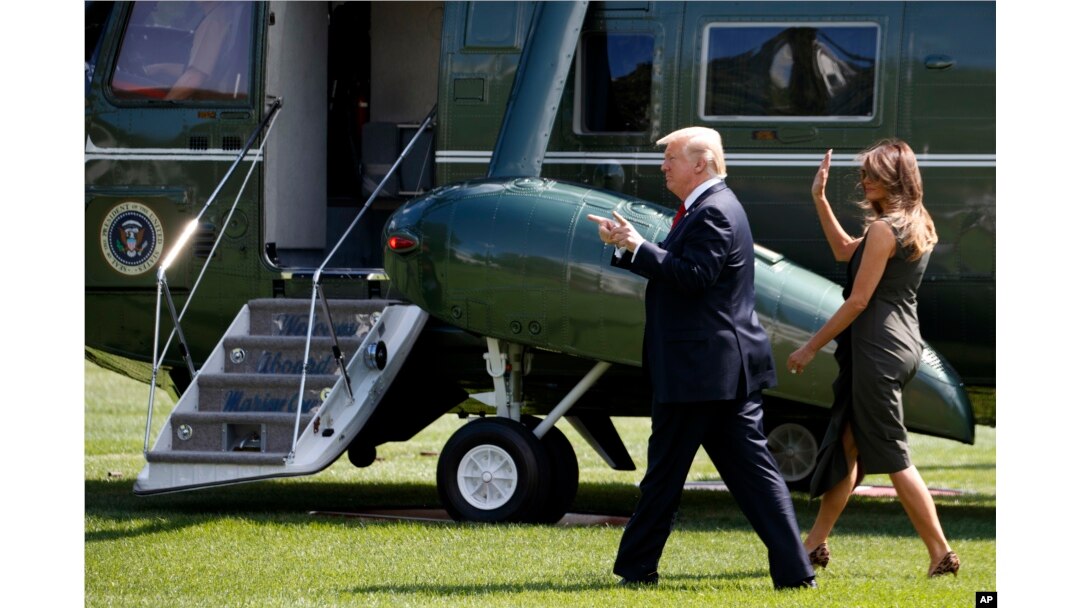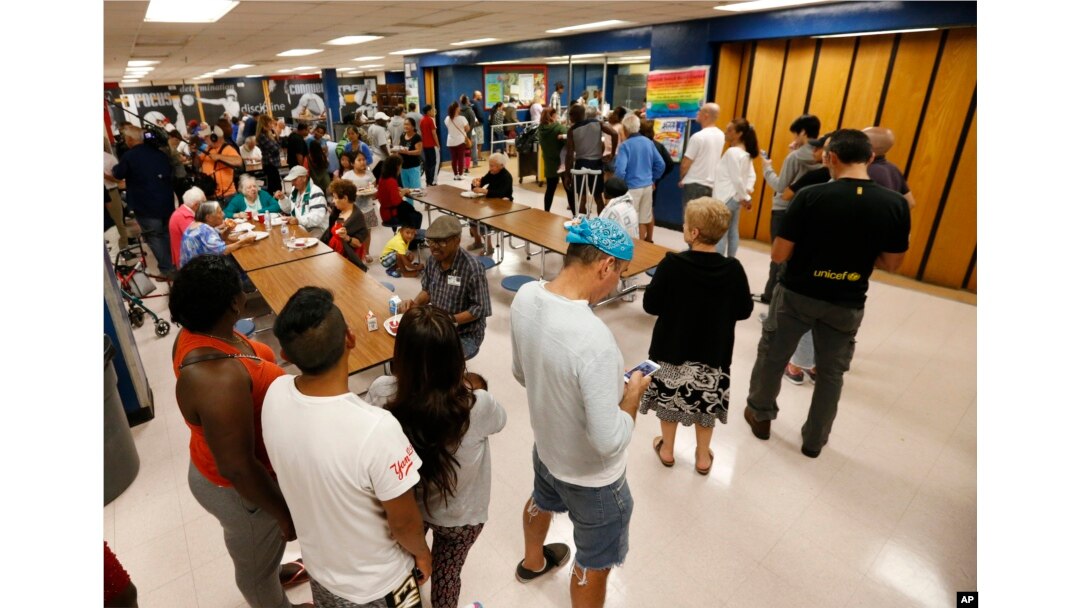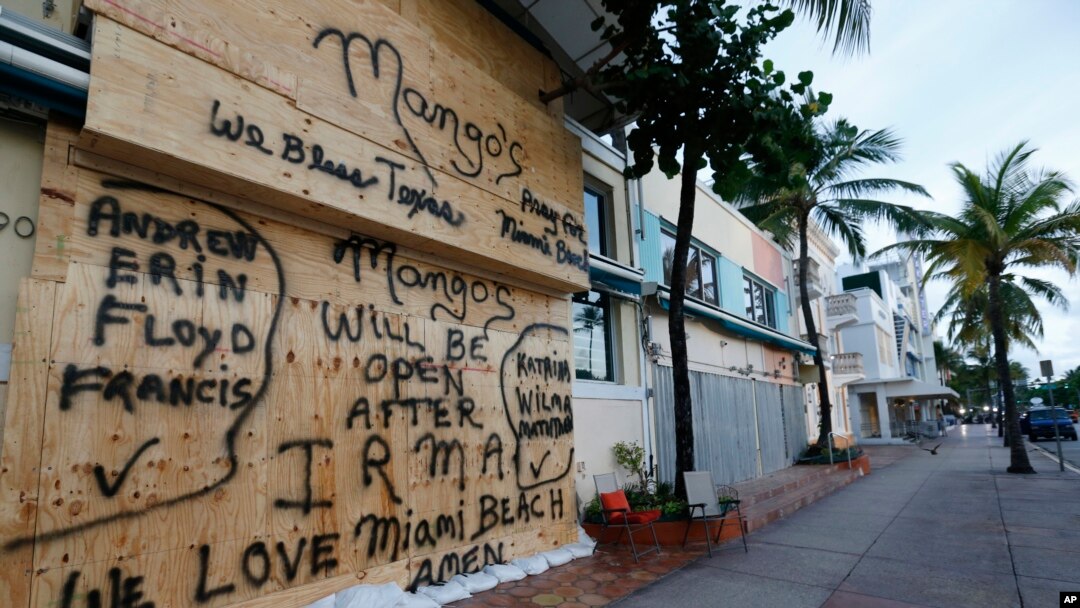U.S. President Donald Trump and his Cabinet are to meet Saturday concerning Hurricane Irma, which is poised to slam into the state of Florida after killing at least 21 people in the Caribbean and causing catastrophic destruction.
"It's a really bad one, but we're prepared at the highest level. Hopefully, everything will be well," Trump, standing on the White House South Lawn, told reporters Friday just before boarding Marine One for the helicopter ride to the Camp David presidential retreat, where the Cabinet meeting will occur.

President Donald Trump gestures to onlookers as he walks with first lady Melania Trump to board Marine One on the South Lawn of the White House, Sept. 8, 2017.
"This storm has taken lives already," White House homeland security adviser Tom Bossert noted. "Take care of yourself first, so you can take care of others."
Bossert, speaking during a White House briefing, was asked what his biggest concern was. He replied that "we're worried about the fuel shortages" amid Florida's mass evacuation, noting "five or six" oil refineries in Texas are still out of operation from recent Hurricane Harvey.
Preparations
"We've got tens of thousands of liters of water, we've got food, we've got cots, we've got medical supplies, prepositioned toddler kits, which include diapers, formula, those kinds of things,” acting Deputy FEMA Administrator Kathleen Fox told VOA.
The National Hurricane Center predicted Irma, with maximum sustained winds of 250 kilometers per hour (155 mph) and still several hundred kilometers west of Cuba on Friday afternoon, would turn toward the northwest by late Saturday.

People at a Red Cross shelter set up at North Miami Beach Senior High School wait in line for lunch in North Miami Beach, Florida, Sept. 8, 2017.
It was forecast to slam into the Florida Keys and the southern Florida peninsula Sunday morning.
Forecasts readjusted the storm's potential track Friday more toward the west coast of Florida, which would mean that Miami’s metropolitan area of 6 million people would be spared a direct hit from the storm.
Alp Inal, a businessman in Miami, described the city to VOA’s Turkish service as a ghost town as most people heeded warnings to evacuate the area.
“South Beach, midtown, all these areas are empty. People are fleeing the city by car or by plane if they can find tickets to anywhere. You cannot find gasoline at gas stations, and more than half of the gas stations in Miami are not operational,” he said.
Inal said his family was flying to Boston because it was the only place they could get plane tickets to. “We searched for tickets to New York, Washington, Atlanta and Nashville, but we couldn’t find any,” he said.
Destruction in the Caribbean
Irma was downgraded from a Category 5 to a still-powerful Category 4 hurricane early Friday. Forecasters said the storm, already regarded as the most powerful ever recorded in the Atlantic, was expected to maintain its current level of strength as it approached the continental United States.
The storm tore through 160-square-kilometer Barbuda, prompting Prime Minister Gaston Browne of Antigua and Barbuda to say the island was now "rubble."
WATCH: Officials Urge Evacuations Before Hurricane Hits Southeastern US States
Your browser doesn’t support HTML5
Officials Urge Evacuations Before Hurricane Hits Southeastern US States
The prime minister estimated about 95 percent of all the buildings on Barbuda were either destroyed or damaged.
The island nation was bracing for impact from Category 4 Hurricane Jose.
'Scenes of pillaging'
On the island of St. Martin, shared by France and the Netherlands, there were "scenes of pillaging" as people looted stores and took to the streets in search of food and water, according to Annick Girardin, France's minister for overseas territories.
It could be up to six months before all power is restored on cash-strapped Puerto Rico, a U.S. commonwealth, where Irma knocked out power to more than 1 million people. Witnesses said wires were either lying in the streets or dangling from the poles that managed to stay upright.
Irma also lashed Haiti and the Dominican Republic, which share the island of Hispaniola, with fierce winds and heavy rain, but spared those two countries a direct hit.
In Photos: Hurricane Irma Hits Haiti
Hurricane Irma Lashes Haiti with Fierce Winds, Heavy Rain
Haitian authorities said Irma still caused mudslides and flooded highways and bridges, though, destroying ramshackle homes. Haiti, the poorest country in the Americas, is still recovering from a devastating earthquake in 2010 and Hurricane Matthew last October.
The U.S. Defense Department deployed three Navy ships, about two dozen aircraft and hundreds of Marines to help with recovery in Puerto Rico and the U.S. Virgin Islands.
French and Dutch relief was being flown to their territories, and British Prime Minister Teresa May sent a Royal Navy shipload of military personnel and emergency supplies to British territories in the Caribbean.
FILE - Orlando city employees and volunteers fill sandbags for residents as they prepare for Hurricane Irma in Orlando, Florida, Sept. 8, 2017. Lines of vehicles stretched for miles and many waited several hours to get the sandbags.
U.S. preparations
Emergency shelters in Florida were accommodating evacuees from the state's most vulnerable areas.
"Let's hope there's no hurricane amnesia," Bossert, at the White House, told reporters, stressing that people in Florida should keep in mind the destruction caused by past storms and heed evacuation orders.
Florida Governor Rick Scott said all 7,000 Florida National Guard members were being deployed Friday and thousands of power workers were standing by, ready to go to work.
Noting that Irma was wider than Florida, Scott characterized it as "a catastrophic storm that this state has never seen before."
The governor warned, "We are running out of time. The storm is almost here."


